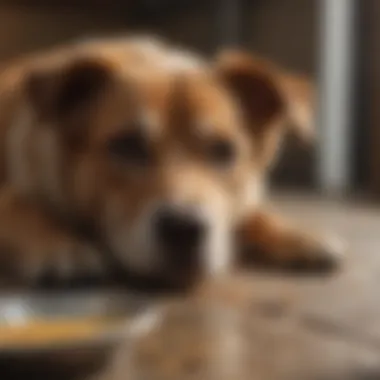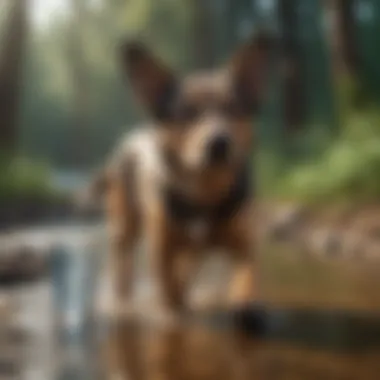What to Feed Your Dog During Diarrhea for Recovery


Intro
Dealing with a dog experiencing diarrhea can be distressing for pet owners. This condition may arise from various sources such as dietary change, stress, sudden illness, or infections. Understanding what to feed your dog in such cases is essential for promoting recovery. This section serves as a comprehensive guide to addressing the dietary needs of your dog when facing diarrhea.
Animal Profile
General Overview
Dogs are part of the Canidae family, and they thrive on a diet that is balanced and nutritious. While they possess a flexible digestive system, abrupt changes in their diet can lead to gastrointestinal issues, including diarrhea. When a dog suffers from this condition, it becomes vital to monitor their diet closely to ensure they regain their health.
Habitat and Distribution
Though domesticated dogs are found worldwide, their ancestors roamed freely in various habitats. This adaptability has equipped dogs to consume a range of foods. However, the nutritional needs of pet dogs differ from their wild progenitors. Owners must prioritize a proper dietary regimen, especially when issues like diarrhea arise.
Dietary Considerations
When your dog has diarrhea, it is crucial to adjust their diet. Focus on providing easily digestible foods. Here are some suitable options:
- Bland Diet: Boiled chicken (without skin and bones) mixed with plain white rice is often recommended. The protein source helps in recovery, while rice serves as a binding agent.
- Pumpkin: Pureed pumpkin can provide fiber which is useful in firming up stools. Ensure you choose pumpkin without added sugars or spices.
- Sweet Potatoes: Cooked and mashed sweet potatoes are another good option due to their fiber content. They are also gentle on the stomach.
- Low-fat Cottage Cheese: The protein from cottage cheese is easier to digest for many dogs. However, introduce it slowly to avoid further gastrointestinal upset.
A sudden return to regular food can exacerbate diarrhea. Gradually reintroduce normal diet over several days.
Hydration
Hydration is paramount during episodes of diarrhea. Ensure that your dog has constant access to fresh water. Dehydration can lead to severe health complications. In some cases, electrolyte replacement solutions specifically formulated for pets may be necessary. It is important to consult your veterinarian about appropriate options to maintain hydration levels.
When to Seek Veterinary Care
If diarrhea persists longer than 24 hours or if your dog shows other concerning symptoms, it is crucial to consult a veterinarian. Signs that warrant immediate attention include:
- Blood in the stool
- Vomiting
- Lethargy
- Fever
- Loss of appetite
This professional guidance ensures you are addressing the issue appropriately and ruling out serious underlying conditions.
Health and Wellness Tips
A dog’s digestive health can be affected significantly by their diet. After a diarrhea episode, focus on preventive measures to support their gastrointestinal health. Here are some recommendations:
- Gradual Diet Transition: When changing your dog’s food, do so gradually to avoid upset stomach.
- Quality Dog Food: Choose high-quality dog food that meets nutritional standards set by organizations like the Association of American Feed Control Officials (AAFCO).
- Regular Vet Visits: Frequent check-ups with a veterinarian can help monitor your dog’s overall health and dietary needs.
By keeping these tips in mind, you can better manage your dog's dietary needs when they experience diarrhea, ensuring a smoother recovery process.
Understanding Diarrhea in Dogs
Diarrhea in dogs is more than just a minor inconvenience. It can indicate underlying health issues and prompt pet owners to take immediate action. Understanding diarrhea helps pet owners differentiate between normal and abnormal bowel behavior in their pets. This knowledge is crucial for effective response, which often involves dietary adjustments and possible veterinary evaluation. Moreover, being informed about diarrhea promotes better overall health management for dogs, ensuring they receive proper care when needed.
Defining Diarrhea
Diarrhea is defined as an increase in the frequency and liquid nature of bowel movements. It can occur suddenly and may last for a short time, or it can become chronic. Recognizing the definition of diarrhea is important because it helps in identifying the appropriate behavior required from the owner to mitigate the issue.
Common Causes of Diarrhea
Dietary indiscretion
Dietary indiscretion refers to the consumption of inappropriate or spoiled food. Dogs are known for their indiscriminate eating habits, often consuming items that could upset their stomachs. This cause is highly relevant to our topic since it directly impacts what owners should consider feeding their dogs when diarrhea occurs. The key characteristic of dietary indiscretion is its frequent nature among pets. It presents an opportunity for immediate intervention. However, since it usually resolves itself, it's important for owners to understand monitoring their pet’s food intake to prevent future occurrences.
Food allergies
Food allergies arise when a dog's immune system reacts negatively to specific ingredients in its diet. This might result in gastrointestinal issues, including diarrhea. Heightened awareness of food allergies is valuable for dog owners as it directs them towards identifying problematic foods. The unique feature of food allergies is their potentially serious and long-lasting effects if the allergenic ingredient is not removed from the dog's diet. Thus, understanding food allergies is essential for dietary planning.


Parasites
Parasites such as worms can infect a dog's digestive system, leading to diarrhea. This cause requires prompt attention from a veterinarian. Recognizing and treating parasitic infections is significant for overall health improvement. The characteristic of parasites is their ability to disrupt a dog’s nutritional absorption. This fact emphasizes the importance of incorporating preventive measures in a dog’s overall health management.
Recognizing Symptoms
Frequency of bowel movements
The frequency of bowel movements is an important indicator of diarrhea's severity. Increased frequency can denote a more serious condition. Monitoring bowel habits allows owners to assess whether a dog's situation requires veterinary intervention. A notable aspect of tracking this frequency can lead to quick action, potentially reducing discomfort for the pet. Many owners often overlook this simple monitoring task.
Consistency of stool
The consistency of a dog's stool is a critical aspect of diagnosing the type of diarrhea. Watery stool indicates a loose bowel condition, while slightly softer stools may not require immediate action. Owners should be aware of the variations and document them. The primary benefit of understanding stool consistency lies in its ability to provide insights into the dog’s underlying health status.
Accompanying symptoms
Accompanying symptoms can shed light on the severity and cause of diarrhea. Symptoms such as vomiting, lethargy, or fever may indicate an underlying problem that requires veterinary care. Heightened awareness of these symptoms pushes owners to take an active role in their pet’s health monitoring. Recognizing these signs can facilitate an earlier diagnosis and, consequently, more effective treatment.
It is crucial for dog owners to remain vigilant about their pets’ health, particularly when gastrointestinal issues arise. Immediate response can make a significant difference in recovery.
Importance of Diet During Diarrhea
Proper nutrition plays a critical role in managing diarrhea in dogs. When a dog experiences diarrhea, their gastrointestinal tract is not functioning optimally. This situation can lead to a loss of valuable nutrients and hydration, which are essential for recovery. Thus, finding the right dietary approach is not just beneficial; it is necessary for a swift return to health.
One important element to consider is that a dog’s diet during diarrhea should focus on easily digestible ingredients. These foods help to reduce the strain on the intestinal system and minimize further irritation. An appropriate diet can also aid in re-establishing a healthy balance of gut bacteria, which is essential for proper digestion. The aim is to provide a source of nutrition that supports the body while allowing the digestive system to rest and recover.
In addition, the right diet can alleviate symptoms associated with diarrhea. Foods that are bland yet nutritious can help firm up the dog's stool. This transition is crucial in the recovery process. Pet owners must be attentive to how their dog responds to these dietary changes. Monitoring any improvements or setbacks can guide further dietary decisions.
A balanced diet can enhance recovery by minimizing digestive discomfort and reducing the risk of further gastrointestinal complications.
In summary, addressing the dietary needs of a dog with diarrhea is of paramount importance. A thoughtful approach to nutrition promotes healing, restores gut health, and helps the dog regain normal digestive function.
Nutritional Needs of Dogs
Dogs require a well-rounded diet to maintain overall health, especially during periods of illness. The primary nutritional needs during diarrhea include:
- Proteins: Essential for tissue repair and immune function. Lean meats like chicken or turkey are ideal.
- Carbohydrates: Provide energy. Low-fiber options, such as white rice or boiled potatoes, are favorable during recovery.
- Fats: Necessary for energy, but should be limited until diarrhea resolves. Nutrient-dense sources like fish oil may give some benefit.
- Vitamins and Minerals: Vital for health and recovery, particularly those that support digestive health. Supplementation may be needed in some cases.
It's fundamental for pet owners to select foods that suit these needs while avoiding ingredients that could intensify digestive issues. Read the labels carefully and consult with a veterinarian if unsure about specific products.
How Diet Affects Recovery
Diet significantly impacts a dog's recovery from diarrhea. When a dog is ill, their digestive system is compromised. Feeding them the right nutrients can help restore normal function. A bland diet, comprised of easily digestible foods, allows the gastrointestinal tract to process nutrients without overwhelming it.
Moreover, proper hydration is directly linked to diet. Dogs suffering from diarrhea often become dehydrated due to fluid loss. Ensuring adequate liquid intake, coupled with a suitable diet, facilitates recovery and maintains energy levels. It is essential to encourage drinking water, and in some instances, adding electrolyte solutions may be beneficial.
The duration for which a dog may require a specific diet can vary. Continuous observation is key. Conversations with a veterinarian can provide guidance on timing when to reintroduce regular foods. Recovery times differ by making effective diet changes and closely monitoring how the dog responds.
Recommended Foods for Dogs with Diarrhea
When a dog is facing diarrhea, diet plays a crucial role in recovery. Foods can influence the healing of the gastrointestinal tract and are important in soothing the dog's stomach. An appropriate diet helps control the condition and provides essential nutrients that the dog needs. Keeping the diet simple is often advisable. Certain foods can be easier to digest and help solidify stool, which is why they are highlighted in this section.
Bland Diet Options
Boiled chicken and rice
Boiled chicken and rice is a very common choice for dogs with diarrhea. This diet is light, easily digestible, and less likely to cause further gastrointestinal irritation. The key characteristic of boiled chicken is that it is protein-rich without added fats or seasoning, which can upset the stomach further. The rice provides a good source of carbohydrates.
Advantages: This combination provides many benefits. It helps to firm up the stool and provides crucial energy. Boiled chicken and rice is also well-accepted by most dogs, making it a popular choice in these situations. However, it is important to monitor that the dog does not get prolonged on this diet, as it lacks many necessary nutrients. It should be transitioned back to regular food once recovery is evident.


Pumpkin puree
Pumpkin puree can be a helpful addition to a dog's diet during bouts of diarrhea. The high fiber content in pumpkin aids in the absorption of excess water in the gut, contributing to firmer stools. The unique feature of pumpkin is its natural enzymes that support healthy digestion.
Benefits: It is seen as a safe, natural food option, which is why it is popular among dog owners. Another positive aspect is that pumpkin is low in calories, making it an excellent option for overweight dogs needing to manage their weight while recovering. However, the quantity should be moderate. Excessive pumpkin can lead to digestive upset again.
Mashed potatoes
Mashed potatoes can also be introduced as a part of the bland diet. They are another carbohydrate source that is gentle for the dog’s digestive system. One key characteristic of mashed potatoes is their smooth texture, which makes it easy for dogs to consume.
Consideration: This food is beneficial as it provides an easy-to-digest option for dogs recovering from diarrhea. However, one must ensure that the mashed potatoes are plain and free from butter, cheese, or any seasoning. When fed in moderation, mashed potatoes can help maintain energy levels while recovery is underway. Care should be taken not to overfeed, as starches can sometimes lead to further digestive complaints.
Commercial Dog Foods
Prescribed veterinary diets
Prescribed veterinary diets are specifically formulated for dogs experiencing gastrointestinal issues. These diets focus on highly digestible ingredients that provide the necessary nutrients without adding any stress to the digestive system. A key characteristic of these diets is their composition, which often includes specialized fiber and protein sources tailored to manage diarrhea effectively.
These diets are recommended by veterinarians for a valid reason. They may encompass various nutrients that help restore the balance in the intestinal tract and support healing. However, they can be more expensive and may require a trip to the vet for the right prescription.
High-quality sensitive stomach formulas
High-quality sensitive stomach formulas are available in pet stores and can be beneficial for dogs with diarrhea. These foods are designed to be gentle on a dog's digestive system. The unique aspect of these formulas is that they often contain prebiotics and probiotics, which promote a healthier gut microbiome.
Consideration: The appealing feature of sensitive stomach formulas is their widespread availability. They can provide adequate nutrition without needing a veterinarian's prescription. However, some may be less effective for more severe cases, hence monitoring the dog's response to the food is crucial.
In summary, choosing the right foods during episodes of diarrhea can significantly aid in recovery. Both homemade bland diets and specialized commercial options provide unique approaches, enabling the dog to return to normal eating habits swiftly and safely.
Additional Considerations
When a dog experiences diarrhea, addressing diet alone is not sufficient. The concept of additional considerations plays a crucial role in managing the dog's condition. This section emphasizes the importance of hydration and knowing when to avoid feeding. Understanding these elements can significantly impact the recovery process and overall health of the dog.
Hydration Needs
Telltale signs of dehydration
Dehydration is a potential concern when a dog has diarrhea. One specific aspect to observe is how much water the dog consumes. Common signs include dry gums and lethargy. Monitoring these signs helps in assessing the dog's hydration status.
It's essential to recognize that dehydration can worsen the diarrhea condition. A key characteristic of dehydration is decreased skin elasticity. You can gently pinch the skin on the back of the dog’s neck. If it does not return immediately to its original position, this indicates dehydration. This knowledge is beneficial in determining whether immediate intervention or veterinary care is required.
Unique features of dehydration in dogs also include increased heart rate and irritability. These signs are important since they can guide a pet owner in identifying the severity of the situation early on. Keeping an eye on hydration contributes greatly to managing diarrhea effectively.
Importance of electrolytes
Electrolytes are a key consideration when dealing with a dog experiencing diarrhea. A specific aspect of electrolytes is how they help in maintaining fluid balance in the body. Dogs who lose fluids through diarrhea may also lose essential electrolytes such as sodium and potassium. This can lead to further complications if not addressed.
The unique feature of electrolyte management is its ability to support recovery. Adding an electrolyte solution can replenish what the dog has lost. This is a beneficial choice as it aids in preventing more severe health issues. However, it is important to consult a veterinarian before administering any electrolyte solutions. Certain formulas can vary and may not be suitable for every dog.
When to Avoid Feeding
Knowing when to avoid feeding is equally as important as understanding diet choices during diarrhea. In some instances, withholding food for a short period of time can help the digestive system reset. It allows everything in the gastrointestinal tract to stabilize and can aid in clearing minor issues without additional stress.
Pet owners should consider the duration of diarrhea when deciding if feeding should be temporarily halted. If diarrhea persists beyond 24 hours, it is wise to seek veterinary advice. Furthermore, if the dog shows signs of vomiting alongside diarrhea, it is crucial to avoid feeding until a veterinarian provides guidance. This minimizes the risk of aggravating the dog's condition.
Consulting with a Veterinarian
Consulting with a veterinarian is vital when your dog experiences diarrhea. The fluctuating nature of this condition can stem from various causes, ranging from mild dietary issues to serious health concerns. A professional assessment ensures you address not only the symptoms but also the underlying causes effectively.
Veterinarians can provide guidance tailored to your dog's specific health needs. They can assess how long the diarrhea has lasted, its severity, and any other concerning symptoms your dog may exhibit. This thorough evaluation can guide appropriate dietary adjustments and interventions essential for recovery.


Moreover, a veterinarian can help you understand when dietary management at home is adequate and when further medical treatment is necessary. They may also consider your dog’s medical history, breed, and age. Such details are important in determining the right course of action, emphasizing why a professional’s insight is necessary in these situations.
Recognizing Severity
Understanding how severe the diarrhea is can significantly influence the next steps. If a dog has frequent bowel movements or displays other symptoms such as vomiting or lethargy, it may indicate a more serious condition. Observing any additional signs like blood in the stool, dehydration levels, or if your dog is still eating or drinking adequately are key factors to monitor.
These assessments can guide you when to seek veterinary attention. If diarrhea persists for more than a day or two, consulting a veterinarian becomes imperative. Early recognition can make a substantial difference in treatment outcome.
Diagnostic Tests
Stool analysis
Stool analysis is a practical diagnostic test that involves examining your dog’s feces for parasites, bacteria, or abnormalities. This test provides crucial insights into potential infections or parasitic infestations that may cause diarrhea.
A key characteristic of stool analysis is its ability to distinguish between various gastrointestinal issues. It is often considered a first step when assessing diarrhea's causes. A veterinarian will often recommend this test due to its effectiveness in identifying common issues swiftly.
The unique feature of stool analysis lies in its non-invasive nature. It allows for a detailed examination of the fecal matter, helping in pinpointing problems without stressful procedures for the dog. However, it relies on the collection of a fresh sample, which requires some timely handling.
Blood tests
Blood tests can offer a broader overview of your dog’s health. These tests may reveal underlying conditions that contribute to diarrhea, such as infections, organ dysfunction, or metabolic disorders.
The key characteristic of blood tests is their capability to detect systemic issues that may not be evident through stool analysis alone. It is a beneficial approach in complex cases where concurrent symptoms are present.
A notable advantage of blood tests is their speed. The results can inform your veterinary team quickly, enabling a rapid response if a serious condition is detected. However, it’s essential to consider that blood tests might involve some discomfort for your pet, as they require a blood sample. Understanding their significance helps in deciding the best management strategy for your dog’s health.
Preventive Measures for Future Incidents
Preventing diarrhea in dogs is crucial for their well-being. To ensure your pet stays healthy and avoids gastrointestinal disturbances, attention to ongoing dietary management and regular health assessments is essential. Understanding the factors that contribute to dietary changes and arranging regular veterinary visits can effectively reduce the likelihood of future episodes of diarrhea.
Monitoring Diet Changes
Changes in a dog's diet can lead to digestive upset. It is vital to introduce new foods slowly and observe for any adverse reactions. Recognize that abrupt changes to the diet can impact your dog's gut health significantly. Here are some ways to monitor diet changes effectively:
- Transition Gradually: Incorporate new foods over several days. A good method is to mix a small amount of the new food with the old food, slowly increasing the proportion of the new food.
- Observe Behavior and Stool: Keep track of any changes in your dog's stool consistency or frequency, as well as any signs of discomfort or behavioral changes. This can provide important information on how the new diet is affecting them.
- Maintain a Food Diary: Documenting your dog's diet, including portion sizes and times, can help identify specific foods that may trigger issues. This record will be useful when discussing concerns with a veterinarian.
Monitoring these changes can not only help prevent future episodes of diarrhea but also enhance your dog’s overall health.
Regular Health Check-ups
Regular health check-ups are an integral part of preventing diarrhea and other health issues in dogs. Routine veterinary visits allow for early detection of potential problems before they develop into more serious conditions. Consider the following:
- Comprehensive Examinations: Routine check-ups allow for thorough examinations that can catch underlying health issues, such as parasites or infections, which may contribute to diarrhea.
- Vaccinations and Preventatives: Keeping your dog up to date on vaccinations and preventive medications can help to stave off illnesses that can cause gastrointestinal upset.
- Tailored Nutritional Advice: Discussing your dog's specific dietary needs with a veterinarian during check-ups ensures that your dog's diet is appropriately balanced and meets their health requirements throughout all life stages.
Regular veterinary care creates a proactive approach to your dog's health, reducing the risks of future gastrointestinal disturbances and promoting overall well-being.
Remember: An ounce of prevention is worth a pound of cure. Regular attention to diet and health can save your dog from discomfort and costly treatments later on.
Finale
In this article, we have examined the dietary considerations for dogs experiencing diarrhea. Understanding what to feed your dog during such a condition is crucial. The right diet can significantly impact recovery and overall well-being. Proper nutrition aids in stabilizing the digestive system, replenishing lost nutrients, and addressing any underlying issues.
Summary of Dietary Options
When a dog experiences diarrhea, it’s essential to consider suitable food options. Dogs often respond well to a bland diet. Some options include:
- Boiled chicken and rice, which is easy on the stomach and provides essential proteins and carbohydrates.
- Pumpkin puree, known for its ability to normalize bowel movements due to its high fiber content.
- Mashed potatoes, which offer a soothing texture and easily digestible carbs.
Additionally, there are commercial dog foods designed specifically for sensitive stomachs. These products, like Hill's Prescription Diet i/d and Royal Canin Gastrointestinal, are formulated to be gentle on the digestive tract and can aid in recovery.
Final Recommendations
It is vital to observe your dog's condition closely. If diarrhea persists beyond a couple of days or is accompanied by other concerning symptoms, consultation with a veterinarian becomes necessary. Stay vigilant about hydration, as hydration needs increase during diarrhea. Provide fresh water consistently and consider electrolyte solutions if necessary.
Ultimately, tailoring the diet to your dog's specific condition and observing their response plays a key role in supporting their recovery. Maintaining regular health check-ups can also prevent future gastrointestinal issues. By incorporating these strategies, you can help alleviate your dog's discomfort and promote optimal health.















